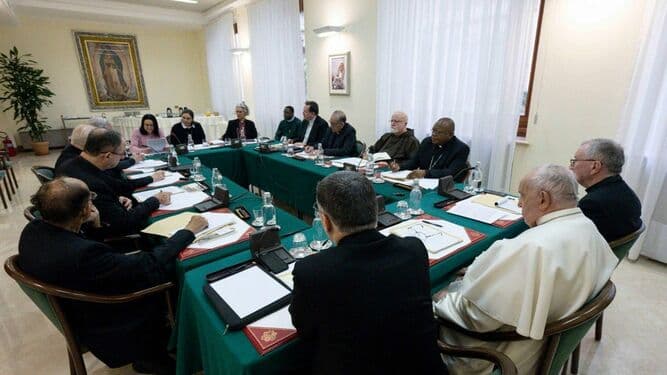ROME – A Spanish nun who has participated in recent meetings of Pope Francis’s top advisory body has said that while women’s priestly ordination is currently off the table, the pontiff is supportive of the female diaconate.
Speaking to the news agency Europa Press, Spanish nun and theologian Linda Pocher said, “There is no reflection on the priestly ordination of women in the Catholic Church,” but the pope “is very much in favor of the female diaconate.”
Pocher was one of three women, including an Anglican bishop, who addressed the most recent meeting of the pope’s Council of Cardinals, a group of cardinals from around the world who advise the pope on matters of Church governance and reform.
For the past two sessions of his Council of Cardinals, called the “C9,” female theologians have been invited to offer input on the role of women in the church, which is among the primary issues the C9 is discussing which is also a key discussion point of the ongoing Synod of Bishops on Synodality, set to conclude this October.
During a Dec. 4-5 meeting of the C9, Pocher, a Salesian and professor of Christology and Mariology at the Pontifical Faculty of Education Auxilium run by her order, was joined by Lucia Vantini, a professor of theology, philosophy and religion, in addressing the council.
Father Luca Castiglioni, a professor of fundamental theology at the diocesan seminary of Milan, also participated in that meeting.
Pocher, Vantini, and Castiglioni published a book on Jan. 24 titled, “Demasculinizing the Church? Critical comparisons on the ‘Principles’ of Hans Urs Von Balthasar,” the preface for which was written by Pope Francis.
The C9 met again from Feb. 5-6, with discussion continuing on the role of women in the Church. Alongside Pocher, two other women spoke: Giuliva Di Berardino, a consecrated virgin from the Diocese of Verona and a professor of spirituality, and Reverend Jo Bailey Wells, a bishop and deputy secretary general of the Anglican Communion.
In her interview with Europa Press, Pocher said she organized the February presentation with Di Berardino and Wells at the pope’s request, and that it was her decision to involve Wells in the conversation.
“The pope asked me to organize this meeting of reflection on the world of women in the Church and to me it seemed interesting to compare the experience of the Anglican Church,” she said.
According to Pocher, she asked Wells to explain the process in the Anglican Church that led to their decision to ordain women, and how this decision “changed life in her Church.”
“What she did was relate an experience which we later discussed together with the cardinals and the pope,” she said.
Pocher said she had asked Di Berardino to speak about “the possible ministries for women in the Catholic Church, above all the possibilities that are really feasible now.”
“The diaconate was also discussed. We know that the pope is very much in favor of the female diaconate, but he is still trying to understand how to put it into practice,” she said.
Pope Francis, Pocher said, is changing the Church’s way “of thinking and living the difference between ordained ministry and the baptismal priesthood, extending to all the baptized some rights that until recently belonged to bishops, priests, or religious.”
To this end, she highlighted the pope’s decision to allow women, for the first time, to vote in last October’s Synod of Bishops. They will also enjoy that right in this year’s second edition of the synod.
In terms of the C9’s response to their presentation, Pocher said members were “very willing to listen. We had a very rich and open dialogue.”
However, she said some of the cardinals were more open to their ideas than others, and that the culture they came from influenced their views.
“The cardinals that are in the council are all pastors of local churches. So, they also come loaded with the sensitivities of their own people. We know that the issue of women in the Church takes on different nuances,” Pocher said.
In some countries, she said, women still lack the possibility of studying, “so you have to focus on that first,” while in other countries, “there is an explicit demand for greater participation at the Church level and also through ministries.”
Debate about women deacons flared in 2016, when Francis announced his decision to establish a commission to study the women’s diaconate after being asked about it during a meeting with the International Union of Superiors General (UISG).
He established the commission the same year, however, the results of that commission were inconclusive.
In 2020, following his Synod of Bishops on the Amazon in 2019, during which the female diaconate was backed by several participants, Pope Francis said he would reestablish the commission, however, like the first, it has also been inconclusive.
Both of Francis’s predecessors, Popes John Paul II and Benedict XVI, faced the question of women deacons, but neither signed off.
During last October’s Synod of Bishops on Synodality, the topics of women priests, the women’s diaconate, and the role of women in the Church in general were among the most debated and contested issues.
The role of women in the Church was one of the most widely addressed issues in the global consultation process leading up to the synod, with laity, clerics and religious alike wanting to address the topic, but with no unified approach or vision for it meant to give women more space.
Discussion will continue with the second half of the synod in October of this year, and once again the issue of women likely will be among the main talking points.
Follow Elise Ann Allen on X: @eliseannallen









